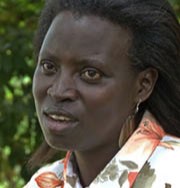Encounters with conflict and peace
An overloaded justice system
By 1999, five years after the genocide, about 120,000 alleged genocide criminals were being held in Rwanda’s prisons.
The court system was swamped - it was going to take over 100 years to get through the backlog of cases.
In November 1994, the UN Security Council, which had done little to stop the massacres, set up the International Criminal Tribunal for Rwanda (ICTR). Based in Arusha, Tanzania, it targeted the ringleaders and organisers of the genocide. By 1999, only seven trials had been completed, at a cost of several hundred million dollars.
Clearly, they had to find another way of delivering justice.

“Traditionally, when someone did something bad, he was brought to the community to explain what he had done - and why he did it - and the community would decide how to deal with that.” - Josephine
Gacaca: justice on the grass
In 1998 the government started looking at the possibility of re-introducing Rwanda’s traditional community justice process called gacaca. The word refers to the small grassy area where villagers would traditionally get together to solve disputes.
It was a controversial idea. Was it wise to hand over the responsibility to the community? What would the rest of the world think? Would it emphasise punishment or reconciliation? President Kagame, who was Vice President at the time, said, "I wan't convinced that gacaca was the best approach. I still don't think gacaca gives us all we need... but it gives us most things... I wanted something stronger than gacaca. The survivors were calling for strong justice. After all, they had been through genocide. Was gacaca going to be enough for them? ...eventually I was persuaded that gacaca would help us deal with the massive number of genocide suspects who were in prison." (1)
(1) Phil Clark: The Gacaca Courts, Post Genocide Justice and Reconciliation in Rwanda. Justice without Lawyers. Cambridge University Press, 2010
Related pages
My friend the killer
ORIGINS OF CONFLICTBefore the genocide, Josephine became friends with one of the interahamwe militia. "I ran into a group of them armed with machetes and grenades. They started pushing me around... watch
A good man
GENOCIDEJosephine tells the story of how her father was killed during the genocide.
"We know you're a good person but we have orders to kill you, so this is what we're going to do... watch
Teaching gacaca
RECOVERY: GACACAThe introduction of gacaca had unexpected results, according to Josephine. Prisoners would point to someone in the audience and say, “Why is he not in prison too? You’re asking us to tell the truth. We were in the killings together..." more
Making amends for murder
RECOVERY: JUSTICEJosephine lost more than sixty relatives in the genocide. How do you do justice for that, she asks... more
Long term effects of genocide
TODAYJosephine said, "What is being done in the healing work is like a drop in the ocean. So there are still people who haven’t yet been given the opportunity to talk about their stories and now, after more than 10 years, it is becoming too much..." watch video
< previous page | next page >
In this section
AN EXPERIMENT IN RECOVERY
Back from the edge
Experiment in recovery
A new Rwanda
JUSTICE
An overloaded system
The importance of justice
Teaching gacaca
Confronting the past
Soft justice?
Has gacaca delivered justice?
PEOPLE WHO KILLED
Helping killers
Sorry
MIND DAMAGE
Recovering from genocide
Living with the pain
Obstacles
Where does it hurt?
BUILDING PEACE
Breaking the cycle
Building peace

Back from the edge
Experiment in recovery
A new Rwanda
JUSTICE
An overloaded system
The importance of justice
Teaching gacaca
Confronting the past
Soft justice?
Has gacaca delivered justice?
PEOPLE WHO KILLED
Helping killers
Sorry
MIND DAMAGE
Recovering from genocide
Living with the pain
Obstacles
Where does it hurt?
BUILDING PEACE
Breaking the cycle
Building peace

